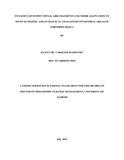| dc.description.abstract | The Northern Rangelands of Kenya are home to approximately 10 Million people and the key
livelihood is pastoralism. The rangelands are a source of numerous and diverse goods and
services, that are sometimes tangible and measurable and others not. These are best categorized
within the Total Economic Value (TEV) framework as direct, indirect, option and bequest
values. Pastoralists’ ability to manage the rangelands has rested in the capacity of customary
institutions to make and uphold rules and sanction breach of rules. These institutional
arrangements are however challenged in their capacity and as a result are changing from their
traditional form into new hybrids of management in order to cope with socio-economic and
ecological changes. There is no substantial information on the dynamism of these institutions as
well as how they affect the value of the pastoralist ecosystem services benefits to support policy
seeking to address the underlying challenges. This study seeks to address this gap by evaluating
the changing nature of pastoralists’ institutional arrangements to cope with the socio-economic
and ecological changes and how this is contributing to value of ecosystem services benefits in
the Northern Rangelands of Kenya.
The study was carried out in Kinna Division (Isiolo, County), Makurian Group Ranch (Laikipia,
County) and West Gate Community Conservancy (Samburu, County), to represent three types of
institutional arrangements. These arrangements include elders only, group ranch committee and
community conservancy board respectively. Key informant interviews, focused group
discussions and household survey methods were used to gather data. Data was managed and
analysed using Ms office (Ms Access, Ms Excel), social network analysis and STATA softwares.
Findings show institutional arrangements are changing overtime and the change is characterized
by an interaction of players indicating co-management. Types of institutional arrangements were
noted to influence economic values of ecosystem services benefits. This was evidenced by the
presence of a robust institutional framework in marginalized area and their support to address
socio-economic challenges thus fueling development. The results further show that external
actors are also attracted to community institutional arrangements that have a semi-formal
structure (group ranch committee and conservancy board), than an elders only type management.
Co-management and livelihood diversification were two observed features of enhanced
resilience that need to be considered to stir development in the Northern Rangelands of Kenya.
The study findings will support the ASAL policy by establishing a multi-sectoral and multistakeholder
framework for regional development. Further, these findings will be useful as the
devolved county governments seek ways of engaging community leadership in both resource
management and economic development. | |

